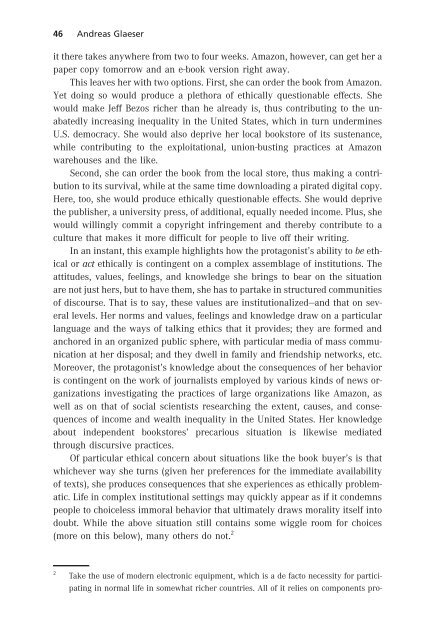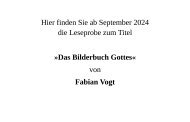Piet Naudé | Michael Welker | John Witte, Jr. (Eds.): The Impact of Political Economy (Leseprobe)
In our late modern pluralistic societies, there are tensions and complementarities between a plurality of individual and social claims and activities to shape societal life and a constructive pluralism of what is known as social systems. The latter provide normative codes and powers emanating from the areas of law, religion, the family, the market, the media, education, academic research, health care, defense and politics. A better understanding and steering of this complex division of powers is crucial for the common good and for freedom and peace. In this volume, a multi-disciplinary team of experts from Germany, Italy, Australia, the UK, the USA, and South Africa bring their conceptual, empirical and historical insights to bear in three broad sections: »The moral dimension of social systems«; »The interaction of religion, law and education with political systems«; and »The moral (mal)-formation evident in case studies on the global financial crisis and social media«.
In our late modern pluralistic societies, there are tensions and complementarities between a plurality of individual and social claims and activities to shape societal life and a constructive pluralism of what is known as social systems. The latter provide normative codes and powers emanating from the areas of law, religion, the family, the market, the media, education, academic research, health care, defense and politics. A better understanding and steering of this complex division of powers is crucial for the common good and for freedom and peace.
In this volume, a multi-disciplinary team of experts from Germany, Italy, Australia, the UK, the USA, and South Africa bring their conceptual, empirical and historical insights to bear in three broad sections: »The moral dimension of social systems«; »The interaction of religion, law and education with political systems«; and »The moral (mal)-formation evident in case studies on the global financial crisis and social media«.
Create successful ePaper yourself
Turn your PDF publications into a flip-book with our unique Google optimized e-Paper software.
46 Andreas Glaeser<br />
it there takes anywhere from two to four weeks. Amazon, however, can get her a<br />
paper copy tomorrow and an e-book version right away.<br />
This leaves her with two options. First, she can order the book from Amazon.<br />
Yet doing so would produce aplethora <strong>of</strong>ethically questionable effects. She<br />
would make Jeff Bezos richer than he already is, thus contributing to the unabatedly<br />
increasing inequality in the United States, which in turn undermines<br />
U.S. democracy. She would also deprive her local bookstore <strong>of</strong> its sustenance,<br />
while contributing to the exploitational, union-busting practices at Amazon<br />
warehouses and the like.<br />
Second, she can order the book from the local store, thus making acontribution<br />
to its survival, while at the same time downloading apirated digital copy.<br />
Here, too, she would produce ethically questionable effects. She would deprive<br />
the publisher, auniversity press, <strong>of</strong> additional, equally needed income. Plus, she<br />
would willingly commit acopyright infringement and thereby contribute to a<br />
culture that makes it more difficult for people tolive <strong>of</strong>f their writing.<br />
In an instant, this example highlightshow the protagonist’sability to be ethical<br />
or act ethically is contingent on acomplex assemblage <strong>of</strong> institutions. <strong>The</strong><br />
attitudes, values, feelings, and knowledge she brings to bear on the situation<br />
are not just hers, but to have them, she has to partake in structured communities<br />
<strong>of</strong> discourse. That is to say, these values are institutionalized—and that on several<br />
levels. Her norms and values, feelings and knowledge draw on aparticular<br />
language and the ways <strong>of</strong> talking ethics that it provides; they are formed and<br />
anchored in an organized public sphere, with particular media <strong>of</strong> mass communication<br />
at her disposal; and they dwell in family and friendship networks, etc.<br />
Moreover, the protagonist’s knowledge about the consequences <strong>of</strong> her behavior<br />
is contingent on the work <strong>of</strong> journalists employed by various kinds <strong>of</strong>news organizations<br />
investigating the practices <strong>of</strong> large organizations like Amazon, as<br />
well as on that <strong>of</strong> social scientists researching the extent, causes, and consequences<br />
<strong>of</strong>income and wealth inequality in the United States. Her knowledge<br />
about independent bookstores’ precarious situation is likewise mediated<br />
through discursive practices.<br />
Of particular ethical concern about situations like the book buyer’s isthat<br />
whichever way she turns (given her preferences for the immediate availability<br />
<strong>of</strong> texts), she produces consequences that she experiences as ethically problematic.<br />
Life in complex institutional settings may quickly appear as if it condemns<br />
people to choiceless immoral behavior that ultimately draws morality itself into<br />
doubt. While the above situation still contains some wiggle room for choices<br />
(more on this below), many others do not. 2<br />
2<br />
Take the use <strong>of</strong> modern electronic equipment, which is adefacto necessity for participating<br />
in normal life in somewhat richer countries. All <strong>of</strong> it relies on components pro-
















